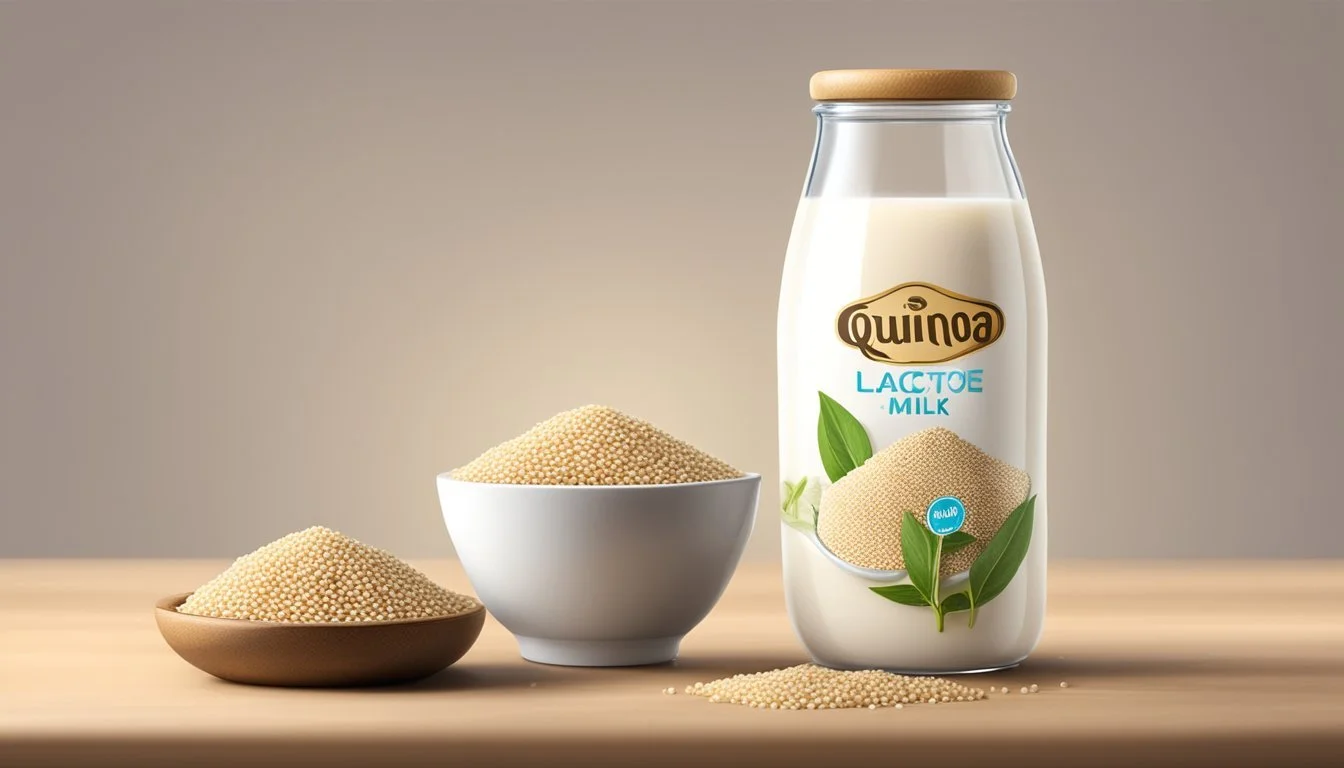Is Quinoa Milk a Good Alternative for Lactose Intolerance?
Unveiling the Benefits
Quinoa milk is an emerging alternative for those with lactose intolerance, offering a unique nutritional profile that distinguishes it from other non-dairy milks. Derived from the seeds of the quinoa plant, this milk substitute has garnered attention for being a complete protein source. Complete proteins contain all nine essential amino acids that the body cannot produce on its own, which are crucial for various bodily functions. For individuals avoiding lactose, a sugar found in milk that often causes digestive discomfort, quinoa milk presents a potential solution that doesn't sacrifice on the protein front.
The slightly nutty flavor of quinoa milk makes it a versatile addition to a variety of dishes, from cereals to baked goods, and it can even complement coffee. Its adaptability in culinary applications is similar to that of cow's milk, yet it caters to the dietary restrictions of those with lactose intolerance. As consumers increasingly seek out plant-based alternatives to dairy, the nutritional content of these substitutes becomes ever more important.
While quinoa milk offers benefits in terms of protein content, it is also important to consider its full nutritional value, including vitamin and mineral content, when comparing it to other non-dairy alternatives. Each alternative milk comes with its own set of advantages and potential drawbacks, whether it's the added fiber in oat milk or the lower calorie count in almond milk. As such, quinoa milk may serve as a good alternative for lactose-intolerant individuals, particularly those looking for a balanced protein intake in their choice of non-dairy milk.
Understanding Lactose Intolerance
Lactose intolerance affects a significant portion of the population, presenting with recognizable symptoms and stemming from the body's handling of lactose found in dairy products.
Symptoms and Diagnosis
People with lactose intolerance experience gastrointestinal discomfort after consuming dairy products. The primary symptoms include:
Diarrhea
Bloating
Gas
Vomiting
These symptoms occur due to a deficiency in lactase, the enzyme responsible for breaking down lactose, which is the sugar found in milk. To diagnose lactose intolerance, physicians may administer a lactose tolerance test, which measures the body's reaction to a liquid high in lactose, or a hydrogen breath test, where increased hydrogen levels in the breath indicate improper digestion of lactose.
Lactose and Its Role in the Body
Lactose is a disaccharide found in milk and other dairy products. It is an important energy source and plays a vital role in the diets of children and adults; however, to be utilized, lactose must be broken down by lactase into simpler sugars. Those who are lactose intolerant do not produce enough lactase, resulting in the inability to properly digest lactose. This can lead to the uncomfortable symptoms mentioned earlier when drinking milk or consuming dairy-based foods.
Quinoa Milk Overview
Quinoa milk emerges as a nutritious plant-based alternative, offering essential amino acids and a unique nutritional composition.
Nutritional Profile
Quinoa milk is distinguished by its complete protein content, as it encompasses all nine essential amino acids required by the human body. Its nutritional spectrum includes a myriad of vitamins such as Vitamin E and B vitamins. In addition, this plant-based milk provides a source of minerals and antioxidants like quercetin. Each cup of unsweetened quinoa milk contains approximately:
Calories: 70-100
Protein: 2-4 grams
Fat: 1-2 grams
Saturated Fat: 0 grams
Carbohydrates: 12-14 grams
Fiber: 1-2 grams
Sugar: 0-2 grams
Notably, quinoa milk is naturally devoid of cholesterol and lactose, making it suitable for those managing cholesterol levels or with lactose intolerance.
Potential Health Benefits
Quinoa milk is plant-based and thereby suitable for vegan diets and those with dietary restrictions concerning dairy products. The absence of lactose caters to individuals with lactose intolerance. The inclusion of omega-3 fatty acids and fiber might contribute to overall heart health. Quinoa milk's low glycemic index suggests a stability in blood sugar levels, with potential benefits for those monitoring their glycemic load. Moreover, as a gluten-free option, it extends its benefits to those sensitive to gluten or with celiac disease.
Comparing Milk Alternatives
When exploring different milk alternatives, it's important to consider their nutritional content and how they fare in various culinary contexts.
Nutritional Comparisons
Different milk alternatives offer varied nutritional benefits. Soy milk, for example, closely matches the protein content of cow's milk with about eight grams per serving. It's also often enriched with vitamins and minerals. Oat milk is appreciated for its fiber content and has a calorie count similar to cow's milk. Almond milk is lower in calories and rich in vitamin E, particularly when unsweetened, and some varieties, like MALK brand, offer added fiber.
Rice milk is the least allergenic, making it suitable for people with milk allergies or lactose intolerance, but it can be high in carbohydrates and relatively low in protein. Coconut milk offers a creamy texture and is higher in saturated fats, while hemp milk provides a good source of omega-3 fatty acids. Cashew milk comes with a creamy taste and a good dose of vitamin E.
In terms of fortification, many non-dairy milks are enriched with calcium and vitamin D, similar to fortified cow's milk. Organic options are available across these variants for those concerned about pesticide use in their food sources.
Taste and Culinary Uses
Non-dairy milks also vary significantly in taste and culinary uses. Almond milk is known for its mild flavor and versatility, making it suitable for both sweet and savory dishes; it's a common choice for cereals and smoothies. Soy milk's fuller texture is ideal in coffee and baking. Oat milk is often praised for its natural sweetness and thickness, well paired with coffee and for making creamy sauces.
Rice milk's lighter consistency is preferred for light sauces and can be a sweet addition to desserts. Coconut milk stands out with its rich and creamy taste, frequently used in tropical smoothies, curries, and baking. Hemp milk has a nuttier flavor, and while not as mainstream, it can be used similarly to other plant-based milks. Cashew milk is another creamy option, often favored in recipes that require a smooth texture, such as soups and cream-based sauces.
Whether it's for cooking, baking, or beverage making, each alternative milk brings unique qualities to the table, and many can be found in both sweetened and unsweetened forms to cater to individual dietary preferences.
Lifestyle and Dietary Considerations
Quinoa milk offers unique benefits and considerations for those monitoring their weight and dealing with allergies, as well as for individuals following vegan or vegetarian diets.
Weight Management and Allergies
Quinoa milk is a desirable option for weight management due to its relatively low calorie content compared to some other milk alternatives. It lacks cholesterol and is naturally low in fat, making it a suitable choice for those aiming to reduce their caloric intake for weight loss. Additionally, quinoa is a good source of magnesium, potassium, and zinc, essential minerals that support overall metabolic health.
For those with allergies, quinoa milk is advantageous because it is gluten-free and does not contain the common allergens found in dairy, soy, or nut-based milks. However, it is crucial for consumers to check for possible cross-contamination if they are particularly sensitive or allergic to other grains or nuts.
Vegan and Vegetarian Diets
People adhering to vegan or vegetarian diets often seek milk alternatives that align with their lifestyle without compromising on nutrition. Quinoa milk is entirely plant-based and cruelty-free, making it a suitable inclusion for these diets. In terms of nutrition, while it may not be as high in protein as soy or cow's milk, quinoa milk still provides a decent amount of this macronutrient, which is vital for muscle repair and enzymatic activities.
Quinoa milk also contains a modest amount of calcium, although often less than cow's milk, which is an important consideration for maintaining bone health. Vegans and vegetarians should ensure they get enough calcium from other dietary sources or opt for fortified quinoa milk products.
Practical Information and Tips
Quinoa milk offers a distinctive taste and nutritional profile, making it a versatile ingredient for those with lactose intolerance. It can be a nutritious addition to various recipes and is available for purchase, but consumers should be mindful when selecting brands to ensure they meet their dietary needs.
Preparing and Cooking with Quinoa Milk
Quinoa milk has a slightly nutty flavor, which allows it to pair well with cereals, enhance the taste of coffee, and serve as a base for creating dairy-free ice cream and yogurt. When using quinoa milk in recipes, it's crucial to consider its unique taste and how it might interact with other ingredients. For cooking:
Cereal: Simply use it as a direct substitute for cow’s milk.
Coffee: Add to taste, just as you would with traditional milk.
Recipes: Use it in equal ratios in baking, smoothies, and sauces.
To make homemade quinoa milk:
Rinse quinoa thoroughly to remove bitterness.
Cook quinoa and blend with water until smooth.
Strain the mixture using a fine cloth or nut milk bag.
For enhanced flavor, consider adding a hint of vanilla or a sweetener like maple syrup.
Finding and Choosing Quinoa Milk
Purchasing the right quinoa milk requires attention to labels:
Look for unsweetened versions to avoid added sugars.
Opt for brands that use minimal gums and stabilizers to maintain purity.
Some may prefer enriched varieties, which include additional nutrients like calcium or vitamins.
When selecting, consumers should consider their dietary preferences and needs. Those looking to avoid nuts should ensure that the milk is almond-free. Here’s a brief guide to selecting quinoa milk:
Preference Suggestion No Added Sugar Check labels for 'unsweetened' verbiage. Low Calorie Look for 'light' or 'calorie-reduced' options. Nut-Free Confirm the absence of nuts on the ingredient list.
Quinoa milk is available in health food stores, some supermarkets, and can be ordered online. Inspiration for its uses can be found across various platforms such as Pinterest, where many dietitians and food enthusiasts share their quinoa milk-based recipes and tips.





